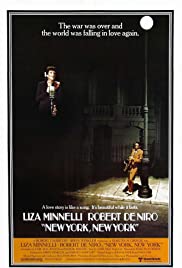Martin Scorsese’s New York, New York is one of his most fascinatingly strange films, a meeting of varied artifices and evasions. Robert De Niro is Jimmy Doyle, a virtuoso saxophone player who resists the confines of the prevailing post-war swing band aesthetic, drawn to more experimental, improvisatory forms; Liza Minnelli is Francine Evans, a singer of more traditional instincts: their incredibly volatile relationship reflects the tensions of diverging desires and ambitions (they meet in the thick of VJ Day celebrations, placing the film in part as a parable of post-war reconstruction). Within the decade or so of the (deceptively conventional sounding) plot, Francine ends up as the bigger star, with a Hollywood and nightclub career that looks much like that of Minnelli’s mother Judy Garland; the film doesn’t emphasize what every viewer knows, that the mainstream will soon leave her behind (Minnelli herself was already at the end of her brief movie-starring heyday). De Niro’s performance is among his most extreme, a barrage of challenges and provocations (Jimmy’s treatment of Francine certainly constitutes some kind of abuse) that doesn’t feel like old Hollywood, but which is too stylized to fit comfortably into the new: coupled with the frequent artificiality of the film’s backdrops, it often feels like pure abstracted challenge. It’s grandly appropriate them that the last stretch of the film consists almost entirely of performances, primarily by Francine (and all absolute Minnelli classics), with her and Jimmy’s personal story coming to be defined by inarticulacy and absence (with echoes of Antonioni’s The Eclipse). Even before that, the movie has several moments that almost seem to pause, to separately observe Francine and Jimmy at moments of silent contemplation, as if insisting that it’s interested in inner lives, even as it represents an America steadily progressing deeper into obsession with image and projection.
Friday, April 10, 2020
New York, New York (Martin Scorsese, 1977)
Martin Scorsese’s New York, New York is one of his most fascinatingly strange films, a meeting of varied artifices and evasions. Robert De Niro is Jimmy Doyle, a virtuoso saxophone player who resists the confines of the prevailing post-war swing band aesthetic, drawn to more experimental, improvisatory forms; Liza Minnelli is Francine Evans, a singer of more traditional instincts: their incredibly volatile relationship reflects the tensions of diverging desires and ambitions (they meet in the thick of VJ Day celebrations, placing the film in part as a parable of post-war reconstruction). Within the decade or so of the (deceptively conventional sounding) plot, Francine ends up as the bigger star, with a Hollywood and nightclub career that looks much like that of Minnelli’s mother Judy Garland; the film doesn’t emphasize what every viewer knows, that the mainstream will soon leave her behind (Minnelli herself was already at the end of her brief movie-starring heyday). De Niro’s performance is among his most extreme, a barrage of challenges and provocations (Jimmy’s treatment of Francine certainly constitutes some kind of abuse) that doesn’t feel like old Hollywood, but which is too stylized to fit comfortably into the new: coupled with the frequent artificiality of the film’s backdrops, it often feels like pure abstracted challenge. It’s grandly appropriate them that the last stretch of the film consists almost entirely of performances, primarily by Francine (and all absolute Minnelli classics), with her and Jimmy’s personal story coming to be defined by inarticulacy and absence (with echoes of Antonioni’s The Eclipse). Even before that, the movie has several moments that almost seem to pause, to separately observe Francine and Jimmy at moments of silent contemplation, as if insisting that it’s interested in inner lives, even as it represents an America steadily progressing deeper into obsession with image and projection.
Subscribe to:
Post Comments (Atom)


No comments:
Post a Comment